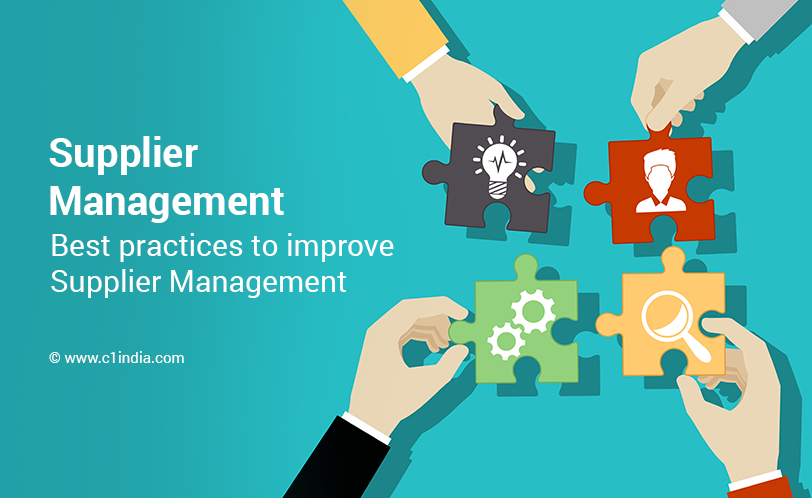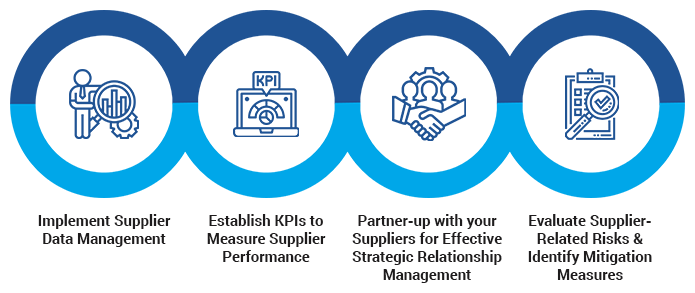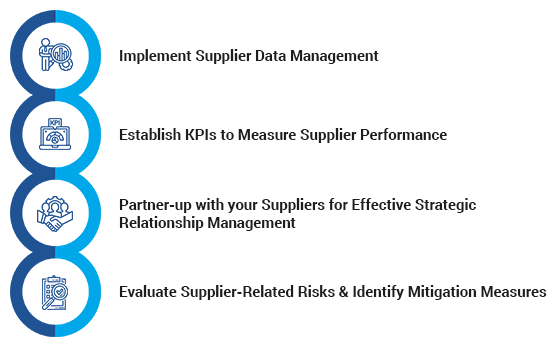Strategies to Improve Supplier Management
By Sanjay Puri, CEO, C1 India

As we are now well-versed with the concept of supplier management and its various aspects. Let's straight away dive into the standard best practices and strategies to improve your supplier management.
In addition to a well-structured framework for managing suppliers, below are some best practices to fortify your supplier management.


- Implement Supplier Data Management –It is defined as a supplier-facing business process that 'creates a consolidated view of supplier data, process status, and relationships by aggregating, collecting, and maintaining data from all distributed systems.'
Having a supplier data management system enables you to :- Streamline and Integrate supplier data from a variety of sources to acquire actionable insights.
- Collaborate with suppliers to better manage strategic partnerships.
- Meticulously monitor suppliers' ability to meet current and future demands.
- Assess supplier risks and devise mitigation strategies.
- Establish KPIs to Measure Supplier Performance – It's critical to have KPIs while managing supplier lifecycles. KPIs assist in measuring supplier performance to evaluate value creation and identify areas of concern. They act as an anchor for growth and measuring results.
- Partner-up with your Suppliers for Effective Strategic Relationship Management – Ascertain that your business aims and goals have been appropriately communicated to your suppliers. Suppliers can make propositions that will provide maximum value for your business demands after the objectives are understood. To take advantage of synergies, include them in the decision-making process. This strategy will aid in the development of collaborative partnerships with suppliers. Supplier relationship management can assist you to get the most out of your suppliers and streamline your supply chain.
- Evaluate Supplier-Related Risks & Identify Mitigation Measures – This is one of the most fundamental approaches for a successful supplier management strategy. It's critical to detect supplier risks that wreak havoc on the supply chain, obliterate cost savings, and degrade performance. Financial, operational, data security, and regulatory risks are the most significant to be cautious of. Examine the implications of these risks for your supplier management and design strategies to effectively mitigate them.
IN A NUTSHELL
In this series, we have taken a close look at one of the vital aspects of business functioning – supplier management. Due to the extreme globalisation of economies, engaging suppliers in your company processes has become inevitable. An effective supplier management strategy not only enables you to derive maximum value for your business requirements but also gives you a competitive advantage. It helps you achieve cost-savings by improving the quality of your goods and services, which impacts your bottom line. It's time to put your suppliers in the front seat and steer your company's future.
To further ease your pain, C1 India’s Vendor Management Solution is extremely robust and offers superior functionality for managing your supplier data for meticulously evaluating performance, managing supplier-related risks, and nurturing strategic relationships. C1’s highly flexible and customizable platform offers you to conduct research and surveys to help you extract meaningful analytics and insights.
The comprehensive supplier management software offers a unified data centre for storing entire supplier-related information and provides tools for assessing supplier performance along with auditing capabilities. We also offer you the opportunity to bank on undiscovered possibilities with our exclusive vendor network to build and establish long-term collaborative partnerships.
Key Features of C1 India’s Vendor Management Solution
- Onboard qualified new suppliers through various in-built assessment tools and techniques.
- Supplier registration onboarding, dynamic profile management for suppliers, supplier categorization (local, international and SME, etc), and supplier approval workflow.
- Smooth and streamline integration throughout the procurement process.
- Datacenter for storing strategic and transactional information. Set KPIs for various assessments.
- Track and evaluate supplier performance, build contingency plans, and easily follow up.
- Lifecycle management and catalogue management.
- Knowledge hub for the procurement community and suppliers.
- Flexible collaboration at any stage of the process.
- Build and develop long-lasting partnerships.
To know more about our Vendor Management Solution or to book a demo, get in touch with us.
